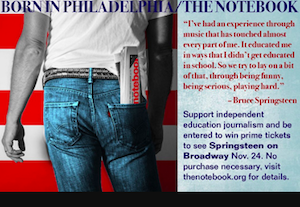For the nonprofit publisher, it seems as if everyone is in your space, seeking the same foundation money, staging rival end-of-year fundraising drives.
Maria Archangelo wanted to try something different. Her decision kept her up at night, and she wondered if she’d be fired. The move, earlier this year, was a stretch from her editorial mission of providing school and education news where others didn’t go, but she felt she needed to do something striking.
As publisher of the Philadelphia Public School Notebook, an independent website and newspaper reaching parents, teachers, students and policymakers in Pennsylvania’s biggest city, she had access to a small marketing budget.
She drained all $3,000 of it on two Presidents Day weekend tickets to “Hamilton” on Broadway. Anyone who donated could win.
Archangelo, who spent decades as a hard-charging reporter and editor, was not fired. She ended up raising $36,000 — and got a $25,000 matching donation on top of it.
“They were great seats,” she says.

Before another fund-raiser, she persuaded a member of her board to let her auction off a winter week in her Key West vacation home. This autumn, donors contributed to support the publication’s mission—and the chance for tickets to see Bruce Springsteen on Broadway. And yes, The Notebook has an end-of-year NewsMatch fund-raiser going on now, which matches the amount a donor gives to double the impact.
While many bemoan a “media apocalypse,” Archangelo is helping sustain her newsroom through imaginative fund-raising, sponsorships and a keen knowledge of her audience. Her site was one of six chosen for a pilot group in a Knight Foundation-funded local journalism program with Facebook. (Disclosure: I was a consultant on that program.)
“She’s clearly a person of ideas, a go-getter, which is really what you need if you are going to be a publisher these days,’’ says Glenn Burkins, publisher of the Charlotte news site Qcitymetro. “She’s unafraid to try new things, and knows how to adjust.”
Archangelo and Burkins are among a batch of inventive entrepreneurs finding ways to keep local news alive. Their small, homegrown sites don’t attract the attention of media chains, nor do they grab the spotlight like digital organizations with backing from mainstream media or venture capital. They don’t have their eyes on scaling their businesses nationally. Yet these smaller publishers may offer hope for Americans concerned about the drying up of local journalism throughout much of the nation.
Like many nonprofit newsrooms, the Notebook relies on a mix of underwriting, membership donations and foundation support to pay the bills. While foundation support is often tied to specific projects, Archangelo is building her donor base, raising money for stories central to the Notebook’s mission.
The Notebook is a pioneer in the city’s nonprofit journalism ranks, established in 1994. As newspaper staffs dwindled, the Notebook took up the slack on school accountability in vast swaths of the city. It kept a focus on tackling trauma in schools and may have hastened the city’s testing of lead in school water. It has spurred questions over school privatization and questionable charter school deals.
“It was ahead of its time, mission-driven, focused on equity and equality,” says Dale Mezzacappa, a onetime competitor at the Inquirer who now is the Notebook’s contributing editor. “They thought the voices of parents and students in underserved schools weren’t getting coverage from the mainstream media, i.e. me. I didn’t actually agree.”
The Inquirer, in its heyday, “had hundreds of reporters and editors, but only one reporter on the education beat” for Philadelphia, Mezzacappa says.
The Notebook moved from a shoestring operation to a network of respected freelancers. Mezzacappa joined the staff in 2008. Even with six staffers now, the Notebook doesn’t have the hum of a daily newsroom, Mezzacappa acknowledges, but editorially, there’s not much change.
“Yes, there’s a mission, but the mission is quality and equality in the Philadelphia schools. When you think about it, there’s not much to argue about. The story is equity. The story is quality. The story is that you don’t have a big-city school district with the money to do what it needs to do.”
The Notebook and other single-subject newsrooms, often nonprofits, have advantages, says Charlotte Hall, a Notebook board member, former editor of the Orlando Sentinel and former managing editor of Newsday.
“When you’re small and have a focus on a particular group, plus have a mission … that defines what you do very sharply. It enables you to do it with fewer resources,” says Hall. “Our editorial focus is pretty sharp.”
In June, Mezzacappa wrote of the restoration of a fabled music program at South Philadelphia High School, which once nurtured Marian Anderson, Chubby Checker, Mario Lanza, Fabian and Frankie Avalon. The funders of the revitalized program included John Legend. South Philly High now boasts a drumline, choir, a winds and brass ensemble and a modern band. School musicals are back, too (“Dreamgirls” last year and “The Wiz” this year).
Hall says publishers like Archangelo have to be respected in both the communities they serve and communities that help fund her effort. Other publishers could learn from Archangelo’s entrepreneurial drive, as well as her collaborative, listening style, says Mezzacappa, a 45-year journalism vet.
“When you’re in a small place, you have to get along with everyone,’’ Mezzacappa says, “or it all falls apart.”
Correction: A previous version gave too-broad of a description for the duties of an Inquirer education reporter in the 1990s; the city education reporter generally covered Philadelphia only, not its suburbs.






